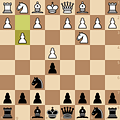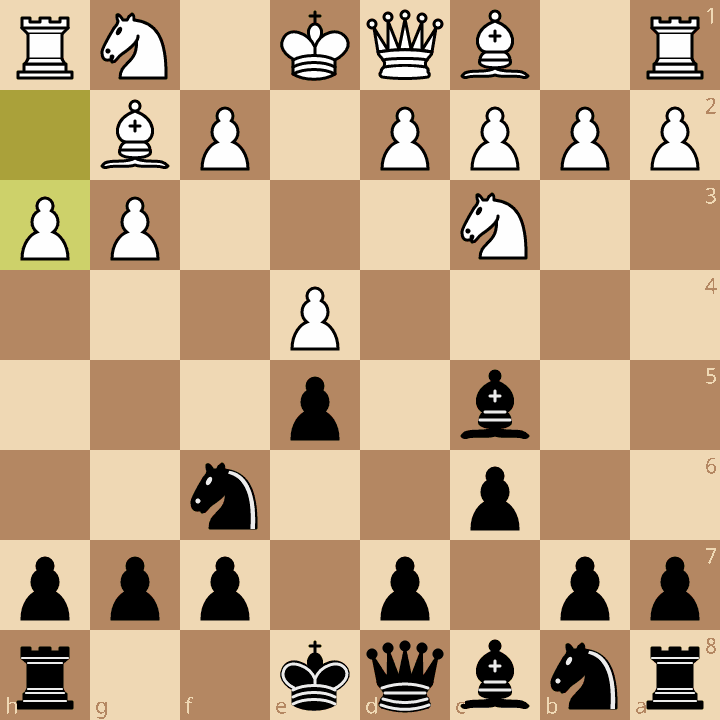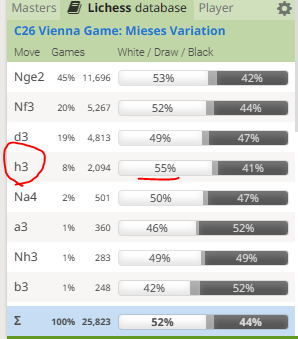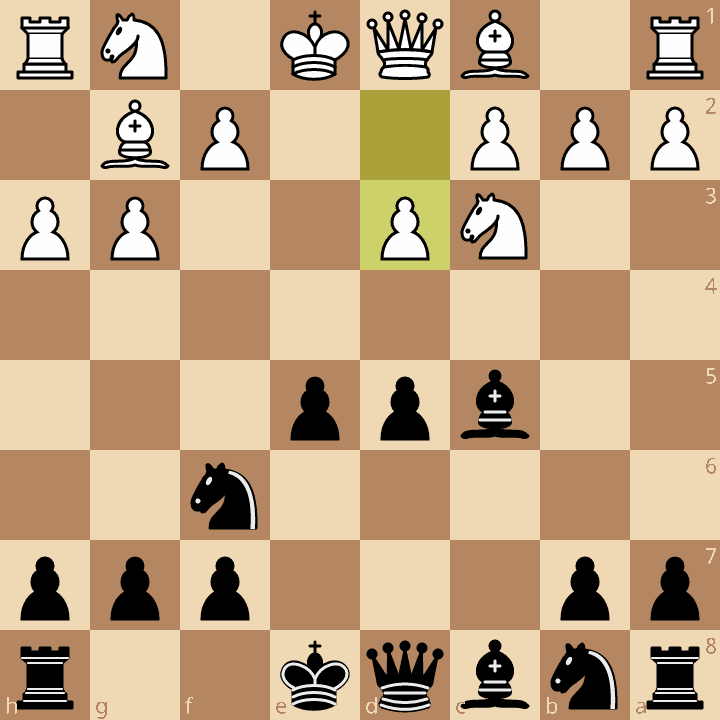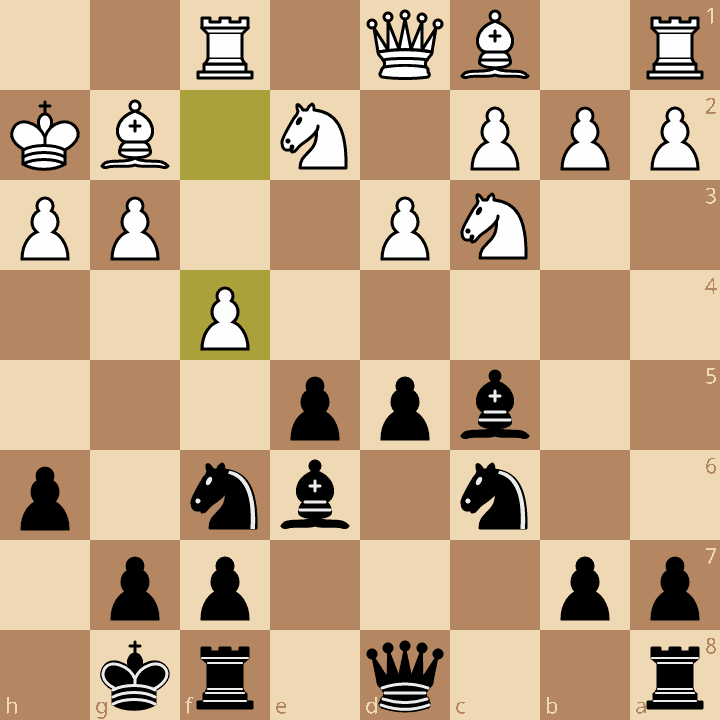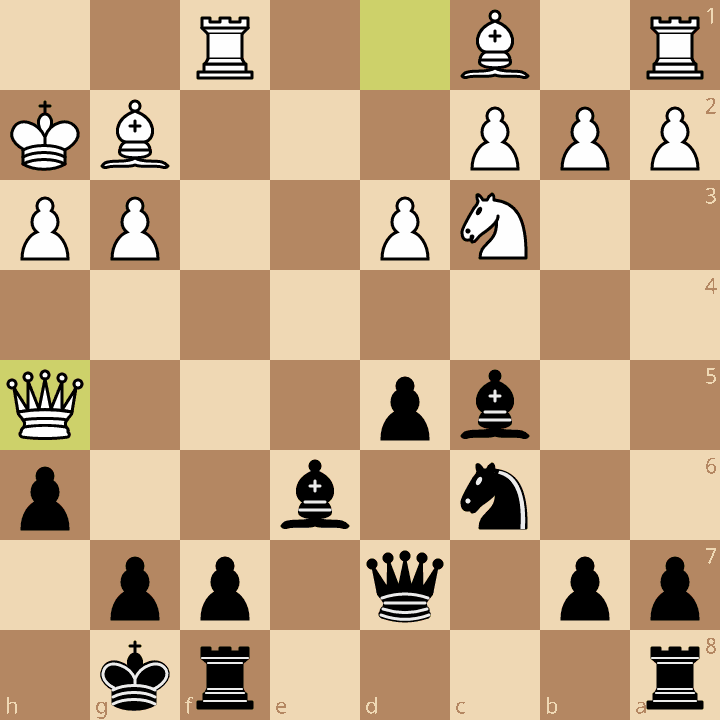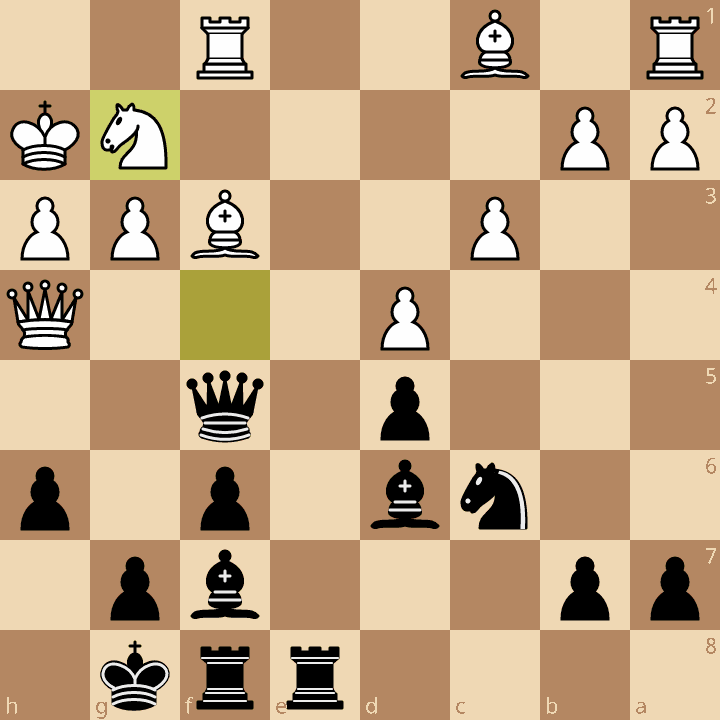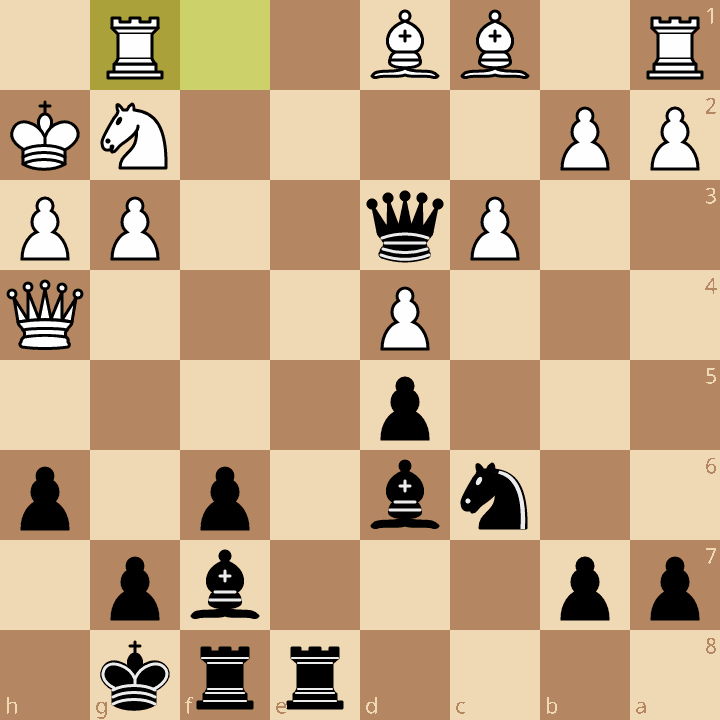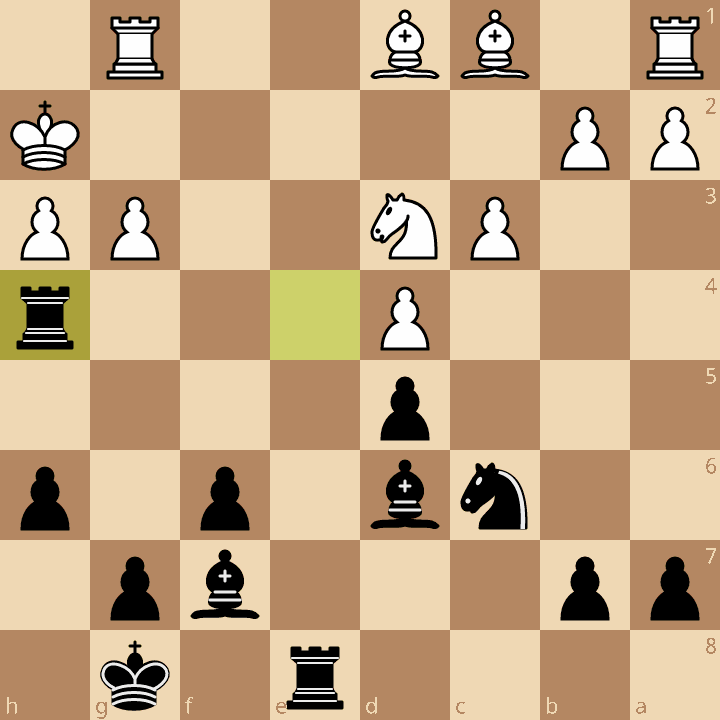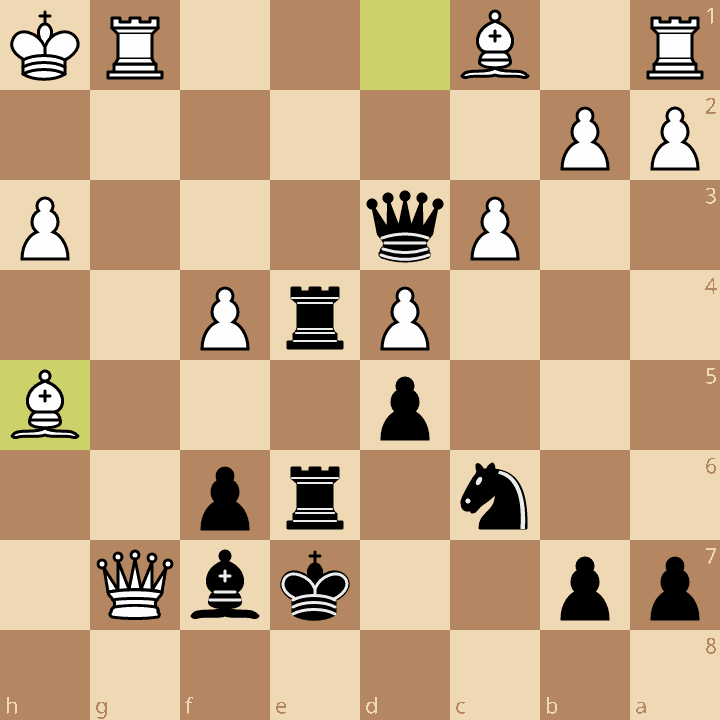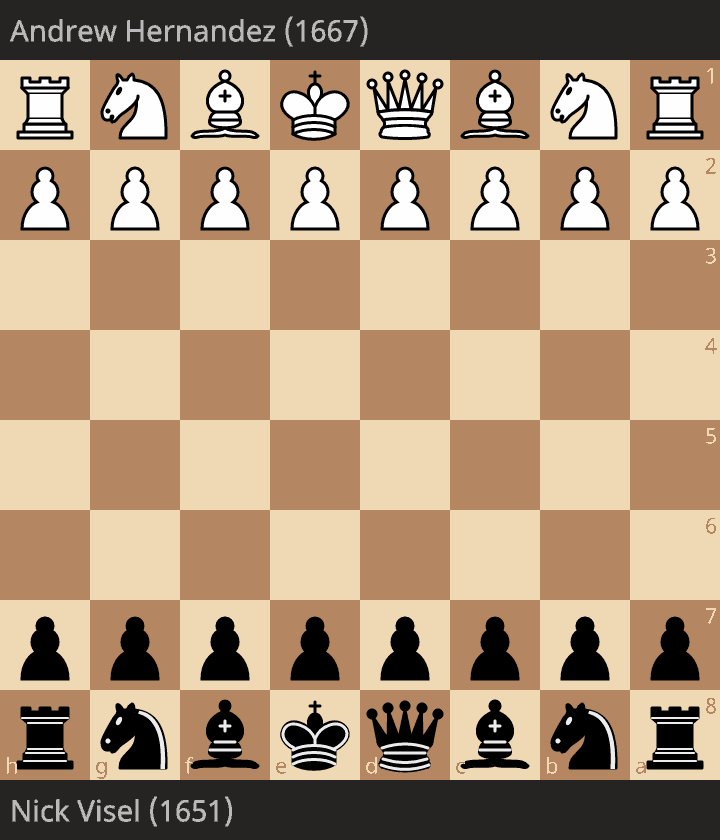After a week away from regular-rated chess, it’s a new tournament at the Sacramento Chess club — a Quad with weekly games. It’s week one, game one, and I get paired in group B. Technically, I believe that I am the lowest-rated player in the group. All of these opponents I have about an equal score historically.
Time Control: 60 minutes + 15 second increment per move.
White: Andrew Hernandez (1667 USCF)
Black: Me (1651 USCF)
Andrew is a strong player, and in general, I find him tricky to play against because he will do things to specifically avoid any prep he thinks I may have against him — The truth is I don’t prep against him for this reason. However, I know his typical repertoire with White involves d4 and an early Bishop Fianchetto, sometimes going for a Pseudo-Catalan without c4.
1.e4
Already we’re in for something completely new. Andrew has never played this against me. But it’s been a while since he’s played, so maybe he’s prepared something.
1…e5 2.Nc3 Nf6 3.g3
OK, now I’m definitely out of book. I know nothing about this line, and have no idea what to expect. However, the kingside fianchetto is typical for him. Since 2023 and 1300 or so games on chess.com, I have seen this line exactly thrice. Each time I won, and each time I played…
3…Bc5
3…d5 makes a lot of sense, since g3 isn’t a developing move. But I like the immediate pressure that Bc5 puts on the kingside.
4.Bg2 c6
Interestingly, I never played this line before, instead opting for O-O or d6 or even d5. Given that I could afford thinking about it in a classical time control, I picked the move that Gawain Jones recommends in his 1.e4 e5 repertoire on Chessable.
5.h3!?
OK. This is a head-scratcher. Over the board, I spent some time thinking how to respond to this, but I think the general idea is to prevent any pieces coming to g4. This move is slow. In fact, Black might be a bit better here because of their lead in development. But the speed with which my opponent played it gave me the uncanny feeling I was falling into someone’s prep. After the game, I looked it up on the lichess databases. 5.h3 is absent from master play, but it scores rather highly in the lichess player’s database — 55% for White across all rating bands.
5…d5
The analogous reply though Jones doesn’t cover this.
6.exd5 cxd5
With this, Black must at least be equal. 6…Qb6!? was worth considering.
7.d3
7…Nc6!?
A move I spent some time considering was 7…Qb6, but I could not see past 8.Na4, and thought that 8…Bxf2+ might not have been worth the trouble for the pawn: 9.Kf1 Qa5 10.c3?, but then black just gets the g3 pawn with 10…Bxg3. White’s best is probably 8.Qd2, and 8…Bd7, there is no more threat of Na5. In the end, Nc6 is just as active, but maybe with a bit less pressure on White’s position.
8.Nge2
8.Nf3 might have been a bit stronger.
8…O-O 9.O-O h6
Simply preventing Bg5
10.Kh2 Be6 11.f4!?
Andrew was still making his moves really fast here. But this move shouldn’t be good for White because of how weak it makes the king. I felt I was in a lot of potential trouble — at this point it seemed obvious he had prepared the position. Also worth mentioning is that the Lichess player’s database says this is played 91% of the time, and White scores well — 53% from this position, despite the fact that the engine evaluation says that Black has an edge (-0.8 at Depth 20, SF16 on Lichess).
11…exf4
Taking up White’s challenge. The weak king position tells me I should be in a decent situation, but it’s difficult to prove over the board.
12.Nxf4 Qd7
Allowing the trade of the bishop for the knight — no Janowski syndrome here. Also, this clears the back rank. For the first time, my opponent takes some time calculating something.
13.Nh5!?
13.Nxe6 fxe6 would be fine for Black.
13…Nxh5
13…Nh7 was also worth considering, asking the knight why it’s there, but I like the idea of freeing my f-pawn to advance to make room for more pieces. I was also worried about possible sacrifices on h6 in the future.
14.Qxh5
14…Bd4?
An unnecessary prophylaxis. I was anticipating a sacrifice on h6. However, the better move was to improve my knight: 14…Ne7, and it’s a game. If White tries the sacrifice 15.Bxh6?! gxh6 16.Qxh6 (16.Rf6 was the move I was really worried about, but Stockfish points out that Be3 or Bd4 are fine responses for Black), then 16…Bd4 and Black has no issues.
15.Ne2
At first, I thought I had blundered a pawn, but it turns out Black is fine after 15.Nxd5 f5 (15…Bxd5?! 16.Qxd5 Qxd5 17.Bxd5) 16.Qf3 g5! After 15.Bxh6?? gxh6 16.Qxh6 Bg7 Black would have been vindicated by the prior move.
15…Be5
Consistent, and now I have another defender on the kingside and can chop on f4 if necessary.
16.c3 f6
16…Rae8 17.d4 Bc7 would lead to a compact position which isn’t bad for Black.
17.d4 Bf7 18.Qh4
if 18.Qg4 Be6 19.Qh5, I would offer the repetition 19…Bf7.
18…Bd6
I want to play Rfe8 and then Bf8; I was torn between this and Bc7, but both should be fine. Overall the position is still equal, and Black’s position is pretty solid — White is having a difficult time trying to open the position. If I can stay solid, maybe I’ll survive.
19.Bf3?
Perhaps planning something like Bg4?
19…Rae8!
The only open file. My main motivation is to put pressure on e2. I also have some motivations to double rooks and completely dominate this file.
20.Nf4 Qf5?!
I thought the threat of Qc2 was strong here. So did my opponent. Instead, 20…Ne7 would have been timed perfectly, heading to f5.
21.Ng2
21…Qc2?!
It turns out this move is not that strong. The King can go to g1 and Black’s got a decent position but no real attack. 21…Qd3 was the natural improvement, but after 22.Rf2, I’d have to look for something else to try. Black’s better, but the last few moves weren’t conducive to improving the position.
However, my opponent was continuing to spend a lot of time in this phase of the game — it’s around the last three moves that he lost 27 minutes to thinking of what to do, and my constant time deficit had started to become a surplus.
Stockfish’s radical suggestion is 21…Qh7!, with the idea of creating a pawn storm and just clubbing the White kingside to death. It’s an extremely fascinating suggestion that gives me a lot of pause about what’s possible in a chess position.
22.Bd1 Qd3
Better late than never.
23.Rg1?!
Time pressure is starting to get to my opponent, and suddenly I feel like I have the psychological edge. 23.Kg1 and it’s still a difficult game for White after Bxg3.
23…Re4??
I’m also low on time and not looking for the best ideas. This move has a snag my opponent finds fast. I had completely missed my resource 23…g5!, when White cannot abandon the g3 pawn because of a mate threat I had completely missed. 24.Qg4 (24.Qxh6?? Qxg3 with mate on the next move) Bh5! 25.Bc2 Bxg3+! 26.Qxg3 Qxc2
24.Nf4! Rfe8??
A blunder, but at the time I thought I was being clever.
25.Kh1??
25.Nxd3! Rxh4 is not an equal trade.
26.Nf4! traps the rook and Black should resign.
25…Bxf4 26.gxf4 R8e6?!
Dumb time trouble move. 26…Bg6 blocks the file. White can’t take: 27.Rxg6 Qxd1 28.Rg1 Qf3 29.Rg2 Re1+ 30.Kh2 R8e2 31.Qg3 Rxg2+ 32.Qxg2 Re2 — Black wins.
27.Qxh6 Kf8??
Sacrificing my kingside and, supposing my opponent had more time to think, probably my king. 27…Bg6! still worked.
28.Qxg7+ Ke7?
28…Ke8 29.Qh8+ Kd7 is more resilient.
29.Bh5??
My opponent and I have just seconds on our clocks. After 29.Bg4 I had planned 29…Nd8, but then White has 30.Bf5 and a winning position.
29…Qxh3# 0-1
An unceremonious end. Not my proudest win, nor my opponent’s favorite loss. Time trouble got in the way of this one, but the ideas I missed here and found in analysis will stick with me. I just happened to make the second-to-last mistake and got lucky.
Takeaways:
Follow my intuition better. I could have created a more exciting game with more uncomfortable moments for my opponent had I just had the guts to do it. Qb6 is the kind of move I’d make in blitz pretty quickly.
Calculate stuff more. A lot of moves, I dismissed due to not having further calculated. This seems counter to point 1, but rather, I think that if I calculated moves which I intuited, I would have found those better moves actually work.
Mentally regroup and re-evaluate positions more often. I missed that the g3 pawn was weak the entire middlegame, and that I had threats against it that were hard to meet. Had I even stepped away to clear my mind from the game, come back, and thought about it, I might have seen this and made the winning process a lot more convincing.
Game in a GIF:

